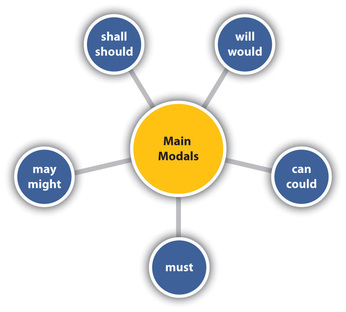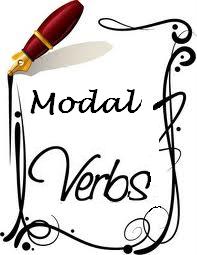MODAL AUXILIARIES
Helping verbs or auxiliary verbs such as will, shall, may, might, can, could, must, ought to, should, would, used to, need are used in conjunction with main verbs to express shades of time and mood. The combination of helping verbs with main verbs creates what are called verb phrases or verb strings. In the following sentence, "will have been" are helping or auxiliary verbs and "studying" is the main verb; the whole verb string is underlined:
Shall, will and forms of have, do and be combine with main verbs to indicate time and voice. As auxiliaries, the verbs be, have and do can change form to indicate changes in subject and time.
- As of next August, I will have been studying chemistry for ten years.
Shall, will and forms of have, do and be combine with main verbs to indicate time and voice. As auxiliaries, the verbs be, have and do can change form to indicate changes in subject and time.
- I shall go now.
- He had won the election.
- They did write that novel together.
- I am going now.
- He was winning the election.
- They have been writing that novel for a long time.
Check out this Prezi on modal auxiliary verbs!
Take this quiz to test your skills:
http://www.e-grammar.org/modal-verbs-can-may-must/test1-exercise1/
http://www.e-grammar.org/modal-verbs-can-may-must/test1-exercise1/
Think that was easy? Try this quiz:
http://www.e-grammar.org/modal-verbs-can-may-must/test2-exercise1/
http://www.e-grammar.org/modal-verbs-can-may-must/test2-exercise1/
CCSS.ELA-Literacy.L.4.1 Demonstrate command of the conventions of standard English grammar and usage when writing or speaking.
CCSS.ELA-Literacy.L.4.1c Use modal auxiliaries (e.g., can, may, must) to convey various conditions.
CCSS.ELA-Literacy.L.4.1c Use modal auxiliaries (e.g., can, may, must) to convey various conditions.



